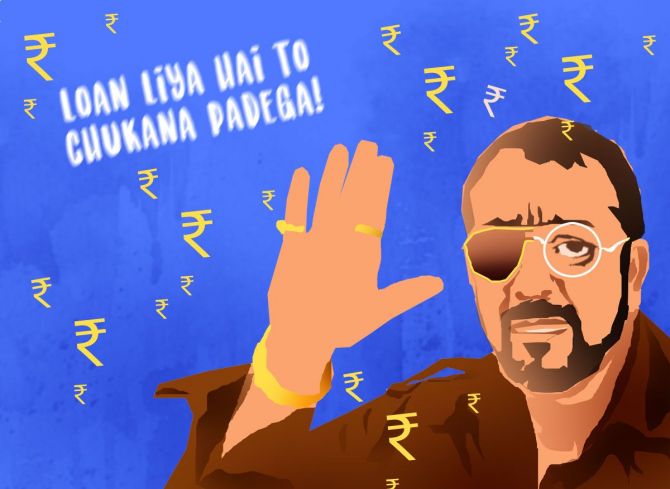Every defaulter is not a wilful defaulter who has the capability of paying back and is yet not servicing the bank loan, observes Tamal Bandyopadhyay.

Remember EMI, the 2008 Hindi film directed by Saurabh Kabra? The Sanjay Dutt-starrer, a social comedy, was all about the recovery of bad loans.
Banks, telecom companies and a string of multinationals were only too happy to engage Sattar (Dutt), owner of Good Luck Recovery Agency, to chase defaulters.
Sattar, operating from Bhendi Bazaar, Mumbai, followed a simple rule for his business -- 'Loan liya hai to chukana padega (if you have taken a loan, you must repay it).'
Two incidents this month remind me of EMI.
A team of bank employees, who had gone to a village in Uttar Pradesh's Gonda district to recover a loan, was allegedly attacked and taken hostage by the loan defaulter! The police later rescued the team of bankers and filed a case against the culprits.
According to Sudhir Kumar Shukla, a senior manager with the Prathama UP Gramin Bank, a team of bankers from the Balpur branch had gone to Sonhara village to recover debt from a loan defaulter, Ghanshyam, who had not returned money taken through the Kisan Credit Card.
Ghanshyam allegedly abused the bank officials and, along with his family members and a few villagers, attacked the team with sticks, bricks and stones, injuring them. The story did not end there. They also took the bankers hostage.
Media reports quoted Superintendent of Police Ankit Mittal saying that five accused had been detained and were being interrogated. The injured were also medically examined.
The other incident is no less interesting.
Kolkata-headquartered UCO Bank issued a circular on November 1, asking its staff to distribute sweets during Diwali to the top 10 defaulters in each branch to show that they are valued.
The central message of the one-page circular, signed by Dheeraj Patwardhan, general manager, recovery and law, was: 'We cannot deny the fact that a customer presently classified as NPA (non-performing asset) was once a valued customer of the bank.'
Stating that the recovery of bad loans is not an easy task, it pointed out that once an account turns into an NPA, there is a deterioration in banker-customer relationship, but every defaulter is not a wilful defaulter who has the capability of paying back and is yet not servicing the bank loan.
There could be compelling reasons such as business failure, which has led to the default; at times, a 'clash of ego between the customer and the bank officials' also leads to an account turning into an NPA.
It called for empathy and establishing a meaningful connection with these customers, bridging the divide developed over time.
This is the way to move forward to get the money lent through vanilla recovery or even one-time settlements.
The top management of the bank had suggested 'distribution of sweet packets to the top 10 NPA borrowers of each branch... like any other valued customers...' The branch head needed to 'personally meet them, greet them'.
The zonal heads were also 'advised to personally meet the top 10 NPA borrowers of the zones on the auspicious occasion of Diwali'.
The circular ended requesting 'strict compliance of the directions' and submission of branch-wise data, collated by the zonal offices, by November 15.
The very next day, the bank withdrew the circular. Why did it do that?
There are many stories going around. Apparently, several senior employees were not happy with the idea.
Some say, retired employees, too, objected to it. Apparently, the management was not happy with the response from a section of the media.
Then, there was the cost factor. If the bank decided to spend Rs 1,000 per packet of sweets, then the cost per branch would be Rs 10,000. Multiply that with 3,500 branches.
If other customers, too, demanded sweet packets, then the cost would be staggering.
We would have loved to see how the plan would have been executed and whether the branch managers would have been able to convince the loan defaulters to drop by at branches to taste the rasgullas.
Different banks have been trying out different things to recover bad loans.
In 2017, Punjab National Bank launched Mission Gandhigiri.
In this scheme, a bankers' team would visit the borrowers' office or residence and sit there silently in an attempt to name and shame the defaulters.
The bank discontinued the scheme and instead has been trying to reach out to the borrowers once it sees stress in an account. PNB also impounded at least 150 passports of 150 wilful defaulters.
The State Bank of India, the nation's largest lender, had partnered with two fintechs to reach out to borrowers who were likely to default.
They would visit such borrowers, identified using artificial intelligence, with chocolates and remind them of the payment of the forthcoming loan instalments.
There are other banks that have printed photographs of loan defaulters in local newspapers and even used posters with their photographs in the locality where they live.
The Gandhigiri or Munna Bhai treatment is one way of recovering bad loans.
The other way, which certain financial intermediaries had adopted in the past, was harassing the loan defaulters and, in rare cases, even forcing them to the extent that some of them ended up killing themselves.
In some sense, the bankers are like Sanjay Dutt, who could play the menacing Kancha Cheena in Agneepath and Munna Bhai the eponymous lead character in Lage Raho Munna Bhai who sees the spirit of Mahatma Gandhi and begins to practise Gandhigiri (a neologism for Gandhism) to help ordinary people solve their problems. (Incidentally, Dutt's Agneepath is a remake of a 1990 Amitabh Bachchan starrer of the same name where Danny Denzongpa played the role of Kancha Cheena.)
Both the finance ministry and the Reserve Bank of India have taken note of the Kancha Cheena treatment meted out to borrowers by some financial intermediaries.
Finance Minister Nirmala Sitharaman has gone on record to say that the government has instructed public and private sector banks to pursue loan recovery cases with sensitivity and not resort to harsh steps.
The new RBI norms restrain all regulated entities and their recovery agents from calling borrowers or guarantors before 8 am and after 7 pm for the recovery of overdue loans.
They are not allowed to resort to intimidation or harassment of any kind, either verbal or physical, against any person in their debt collection efforts.
Incidentally, UCO Bank's gross NPAs dipped to 4.14 per cent of advances in the September 2023 quarter and, after provisioning, net NPAs have come down to 1.11 per cent.
Three years back, in March 2020, its gross NPAs were 16.77 per cent and net NPAs 5.45 per cent.
Recovery of bad loans had contributed handsomely to UCO Bank's net profit in the last financial year. Overall, the banking sector's NPAs are now at a decadal low.
Gandhigiri could be a way of recovering unsecured personal loans, but not the corporate loans that have turned sour and are running into trillions of rupees. That's a different ball game.
Recovery of such loans under the Insolvency and Bankruptcy Code has been slow for many reasons.
The latest Supreme Court judgment may give it a boost.
India's highest court has upheld the Constitutional validity of the initiation of insolvency proceedings against the personal guarantors in case of a default.
Let's wait and watch how personal insolvency comes into play.
Feature Presentation: Rajesh Alva/Rediff.com












 © 2025
© 2025